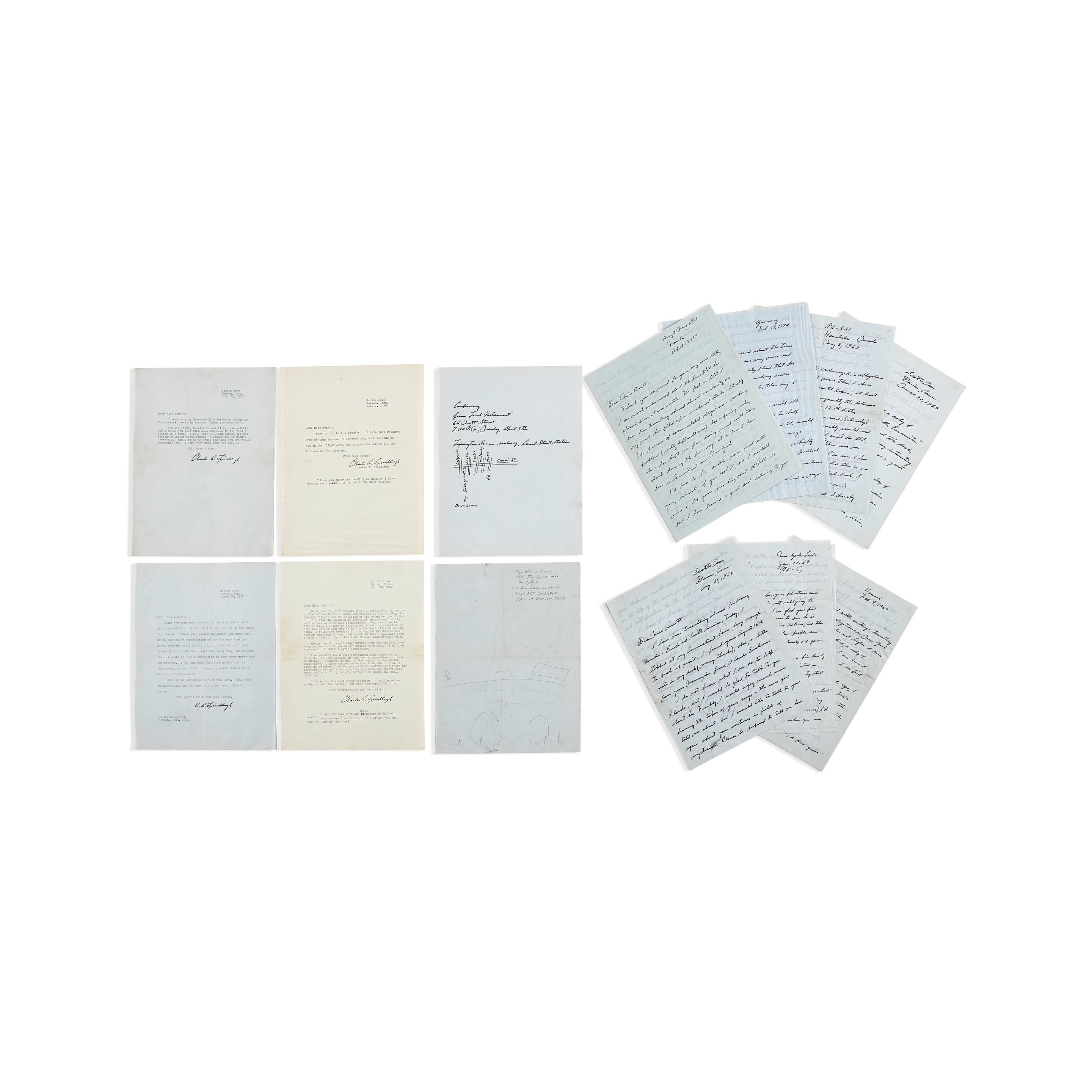LINDBERGH, Charles A. Typed letter signed ("Charles"), to Frederick C. Durant III, Kipahulu, Maui, Hawaii, 30 January 1970. 5 pages, 4to, a few autograph emendations .
LINDBERGH, Charles A. Typed letter signed ("Charles"), to Frederick C. Durant III, Kipahulu, Maui, Hawaii, 30 January 1970. 5 pages, 4to, a few autograph emendations . "I BEGAN CONSIDERING MAN'S ACCOMPLISHMENTS...ONLY SPACE WAS LEFT. COULD MEN EVER ENTER SPACE?" Lindbergh's lengthy, fascinating account of his role in getting funds for Robert H. Goddard's rocket research. This historical memoir was prompted by inquiries from Durant, then assistant director for astronautics at the National Air and Space Museum of the Smithsonian in Washington. One of the many remarkable aspects of this account is the vividness of Lindbergh's memory. Clearly this was an episode of great importance in his life. The idea of rocket travel first came to him, he says, during a solo flight between New York and St. Louis in 1928. "At an 85 mile [per hour] air speed, and bucking a fairly strong wind, I had plenty of time to think. I began considering man's accomplishments in travel. The wheel had given him conquest of the land; the hull, the sea; and wings the air. Only space was left. Could men ever enter space? If so, obviously, we would have to overcome the need for wings and the limitations of propellers. Some form of inertial reaction would be essential for power. I immediately thought of rockets." He goes on to recall meetings with engineers at Du Pont, but they only saw the difficulties and thought it impossible. Only by accident, during a visit with his wealthy friends Harry and Carol Guggenheim, did he stumble across a reference in The New York Times to Goddard's research at Clark University in Massachusetts. The two joined forces for another try at Du Pont, but with Goddard fearful that the company would steal his designs, nothing came of it. "I had, of course, thought of asking Daniel Guggenheim for support," Lindbergh writes, "but did not like to go to my friends for money..." Yet "my increasing belief in the future of rockets finally overcame my hesitancy..." Lindbergh convinced the Guggenheims to give Goddard $100,00 for four years of research on liquid fuel propulsion. "And this professor," Daniel Guggenheim asked, "you believe he is a pretty able man?" Lindbergh replied, "I think he knows more about rockets than any other man in the country." It was, Lindbergh writes, "an extraordinarily generous grant on the standards of the time." But Goddard never achieved sustained rocket flight in his lifetime. That only came about by the efforts of American German scientists after 1945. But in 1974, near the end of his own life, Lindbergh wistfully remarked that "When I see a rocket rising from its pad, I sense Goddard standing at my side, his human physical substance now ethereal, his dreams substantive."
LINDBERGH, Charles A. Typed letter signed ("Charles"), to Frederick C. Durant III, Kipahulu, Maui, Hawaii, 30 January 1970. 5 pages, 4to, a few autograph emendations .
LINDBERGH, Charles A. Typed letter signed ("Charles"), to Frederick C. Durant III, Kipahulu, Maui, Hawaii, 30 January 1970. 5 pages, 4to, a few autograph emendations . "I BEGAN CONSIDERING MAN'S ACCOMPLISHMENTS...ONLY SPACE WAS LEFT. COULD MEN EVER ENTER SPACE?" Lindbergh's lengthy, fascinating account of his role in getting funds for Robert H. Goddard's rocket research. This historical memoir was prompted by inquiries from Durant, then assistant director for astronautics at the National Air and Space Museum of the Smithsonian in Washington. One of the many remarkable aspects of this account is the vividness of Lindbergh's memory. Clearly this was an episode of great importance in his life. The idea of rocket travel first came to him, he says, during a solo flight between New York and St. Louis in 1928. "At an 85 mile [per hour] air speed, and bucking a fairly strong wind, I had plenty of time to think. I began considering man's accomplishments in travel. The wheel had given him conquest of the land; the hull, the sea; and wings the air. Only space was left. Could men ever enter space? If so, obviously, we would have to overcome the need for wings and the limitations of propellers. Some form of inertial reaction would be essential for power. I immediately thought of rockets." He goes on to recall meetings with engineers at Du Pont, but they only saw the difficulties and thought it impossible. Only by accident, during a visit with his wealthy friends Harry and Carol Guggenheim, did he stumble across a reference in The New York Times to Goddard's research at Clark University in Massachusetts. The two joined forces for another try at Du Pont, but with Goddard fearful that the company would steal his designs, nothing came of it. "I had, of course, thought of asking Daniel Guggenheim for support," Lindbergh writes, "but did not like to go to my friends for money..." Yet "my increasing belief in the future of rockets finally overcame my hesitancy..." Lindbergh convinced the Guggenheims to give Goddard $100,00 for four years of research on liquid fuel propulsion. "And this professor," Daniel Guggenheim asked, "you believe he is a pretty able man?" Lindbergh replied, "I think he knows more about rockets than any other man in the country." It was, Lindbergh writes, "an extraordinarily generous grant on the standards of the time." But Goddard never achieved sustained rocket flight in his lifetime. That only came about by the efforts of American German scientists after 1945. But in 1974, near the end of his own life, Lindbergh wistfully remarked that "When I see a rocket rising from its pad, I sense Goddard standing at my side, his human physical substance now ethereal, his dreams substantive."





.jpg)
.jpg)


.jpg)
.jpg)




Testen Sie LotSearch und seine Premium-Features 7 Tage - ohne Kosten!
Lassen Sie sich automatisch über neue Objekte in kommenden Auktionen benachrichtigen.
Suchauftrag anlegen